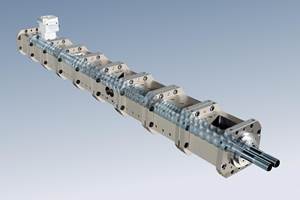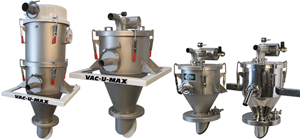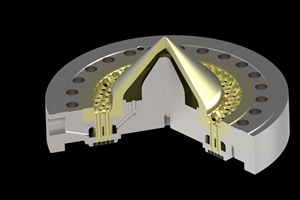What to See at NPE 2006: Compounding and Mixing
Throughput capacities are going up for compounding equipment of all types.
Throughput capacities are going up for compounding equipment of all types. Higher outputs generate more heat, so you’ll also see lots of equipment with enhanced cooling. Above all, you’ll see a lot of unconventional approaches to compounding that bear little resemblance to traditional mixers or twin-screw compounders. Many are designed for very high levels (80% to 85%) of mineral fillers or wood flour. Filler levels are rising because of the high cost of resin.
The latest development in Buss’s Quantec high-output kneader is an output-raising retrofit for older Buss machines in which a Quantec section, with four rows of barrel pins and four overlapping flights, replaces the mixing section with three rows of pins and three non-overlapping flights. The retrofit raises the kneader’s output by 20-25%.
Leistritz’s first North American show of its Maxx twin-screw extruder offers 30% more free volume plus enhanced cooling for higher output. Littleford Day is showing an LR 5500 cooler for the first time with a 90-psi-rated cooling jacket to allow increased water circulation. Cooling jackets are typically rated for under 15 psi. Littleford’s high-intensity mixer is also displayed with dual discharge, allowing it to feed PVC premix to two coolers instead of one for even higher throughput.
Farrel’s CP100 continuous mixer has a drive upgrade that allows higher filler levels—up to 80%. List has a twin-shaft kneader/reactor that can add up to 40% filler to silicone gum. List says it’s the only system that can do that.
Many extruder OEMs show new modular construction approaches to offering customized features more affordably. Entek ‘s modular E-Max co-rotating twin-screw machines can be easily lengthened by adding prefabricated frame extensions. Coperion’s new ZSK 32 MEGAcompounder Plus is built of modules in a frame.
Chinese connections are another route to building compounding machines more affordably. Coperion, which acquired Keya in China, will show Keya’s export-model twin-screw extruder here for the first time. Two exhibitors are Chinese machine builders with European connections. Nanjing Giant Machinery is an ISO-9001 joint venture with Pomini in Italy. It offers co-rotating twin-screw extruders, gravimetric feeders, and a new gear pump.
Guangdong Liansu Machinery is a joint venture with Dressbom GmbH, a German PVC consultant, offering conical and parallel twin-screw extruders and PVC mixing and pelletizing equipment.
More wood in WPCs
News in wood/plastic composites (WPCs) includes the first exhibits of several two-stage mixer-extruder combinations that yield very high wood content and start with undried flour. Lodige/Pappenmeier’s WPC compounding process uses a TSHK friction-heating mixer to coat 85% wood flour with 15% PP. The mix discharges into an HKB horizontal cooling mixer, which produces free-flowing crumbles ready for extrusion.
Draiswerke is showing a 300-hp Gelimat G25S thermokinetic mixer with increased cooling capacity to mix up to 85% mineral filler or wood-flour at up to 2000 lb/hr.
Pallmann Pulverizers is showing its unusual Palltruder here for the first time. A mid-sized PFV 400 processes up to 2500 lb/hr. It combines a single-screw frictional-heat mixer with a die plate and granulator knives to produce free-flowing granules containing up to 85% wood.
News in testing and controls
Several test devices at the show were developed for the new European DIN-EN 13900-5 standard for melt dispersability of color compounds and masterbatches. The standard is known as the Filter Pressure Value (FPV). Exhibitors with FPV test equipment include Dr. Collin, LabTech, and Davis-Standard.
Speaking of color, JSW and FACTS Inc. are using in-line color analyzers to detect color variances and—on a developmental basis—to control letdown of colorants in an extruder. FACTS is showing a new non-contact spectrophotometer from X-rite with FACTS software for closed-loop control of color feeding. JSW is using an Equitech in-line color analyzer.
Related Content
How to Configure Your Twin-Screw Barrel Layout
In twin-screw compounding, most engineers recognize the benefits of being able to configure screw elements. Here’s what you need to know about sequencing barrel sections.
Read MoreSirmax Adapts Integrated Recycling Approach to US Supply Conditions
Integrating compounding and recycling to leverage untapped postindustrial recycling feedstocks.
Read MoreSafety, Recycling, and Compounding Trends Bring New Opportunity to 70-Year-Old Company
NPE2024: Vac-U-Max presents pneumatic conveying solutions for powdered materials.
Read MoreHow to Maintain Pelletizing Quality When Acid Attacks
Developments in the chemistry of polymers and additives have made corrosion a real problem in pelletizers. Here’s how to ward it off.
Read MoreRead Next
For PLASTICS' CEO Seaholm, NPE to Shine Light on Sustainability Successes
With advocacy, communication and sustainability as three main pillars, Seaholm leads a trade association to NPE that ‘is more active today than we have ever been.’
Read MoreMaking the Circular Economy a Reality
Driven by brand owner demands and new worldwide legislation, the entire supply chain is working toward the shift to circularity, with some evidence the circular economy has already begun.
Read More



















